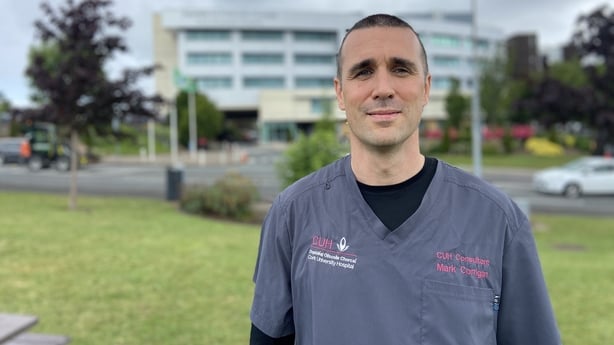A genetic test being offered at Cork University Hospital (CUH) is helping doctors there to tailor treatment to the individual needs of cancer patients, at the same time as identifying if patients' family members have a pre-disposition to cancer.
Funding for the test has been provided for a year by the National Cancer Control Programme, and doctors are hoping it will be made permanent.
Sandra Kelleher, from Macroom in Co Cork, is one of those who has had the test at the CUH.
In January, she was diagnosed with ovarian cancer. Since then, she has completed 20 weeks of chemotherapy.
The mainstreaming genetic test she underwent during her care at CUH - a saliva swab which took around 30 seconds - came too late to prevent her diagnosis, but it did allow her doctors to personalise her treatment and identify if other family members were at risk too.
"Knowledge is power, it means everything. It can actually save lives," Sandra said.
"Thirty seconds is all it takes for this test. I can't say that enough, because my mind was blown by that, and you can save lives. And you can save millions for the HSE through this 30-second test, and you are eliminating a whole set of other problems down the line."
The mainstreaming test is already available in Dublin on the public health system, but demand is significant.
The test is conducted at St James' Hospital and in Crumlin for patients in Dublin and throughout the country. As a result, patients face a wait-time of two years for results.
In Cork, results are being delivered in two months, because the tests are performed by non-geneticists who are specialists in their own areas, like surgical and medical oncologists. It is called 'mainstreaming', because it allows the benefits of very specialised genetic testing to be available in mainstream medicine.
The samples taken from patients are sent to an accredited laboratory in Finland for analysis. The results are then sent to Cork and given to the patients and their doctors.
The results allow doctors treating the patients to draw up care plans specific to each patient.
Doctors say there is less stress for patients, as the tests are taken in the same hospital where they are being treated.
The funding provided by the National Cancer Control Programme allows for support of a consultant geneticist on a part-time basis, and of a genetic counsellor for patients on a full-time basis.
CUH, the hospital's charity and the South/South-West Hospital Group have also contributed to the establishment of the mainstreaming pilot.

Consultant Immunologist and Dean of Medicine at University College Cork, Prof Paula O'Leary, says the mainstreaming pilot in Cork demonstrates the benefits of early, expert genetic assessment provided close to home.
"I believe in equity, and it's really important that we have integrated working, not only of the National Cancer Control Programme, but also of our recently-launched National Strategy for Genetic and Genomic Medicine, to work together to ensure the patients - regardless of where they are in this country - have equitable and timely and appropriate access to the right genetic testing," Prof O'Leary told RTÉ News.
"Travelling long distances for any investigation or for any treatment, for most illnesses will cause disruption for the patient and for their family," he said.
Surgical oncologist Mark Corrigan, who is leading the mainstreaming pilot at CUH, says there are advantages nationally of conducting the test in Cork.

"If we can deliver this locally, it will empower patients here and their clinicians to deliver tailored medicine based on those results locally, without drawing on demands nationally," Prof Corrigan said.
In a statement to RTÉ News, the National Cancer Control Programme said an evaluation of the mainstreaming pilot at CUH had demonstrated an average time from referral received to test result delivered of 57 days.
"The National Cancer Control Programme looks forward to further evaluating and reviewing the outcomes of this important pilot project," the NCCP said.






